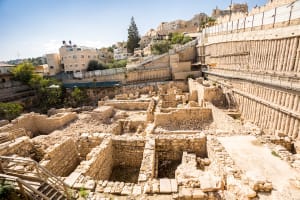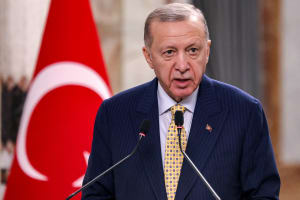Evangelicals can correct course of history and we must – Let's step into the story

We can course-correct history today and we must!
Not that we can travel back in time and change circumstances that have impacted the trajectory of history.
But what we can do, is make choices today that align with the will of God and in doing so, course-correct the consequences of decisions made in history that continue to wrongly set the church in a trajectory never intended by the Lord Jesus.
CONSTANTINE’S CORRUPTION
Specifically, I’m referring to the corruption that took place in A.D. 325 by the Roman Emperor Constantine at the Council of Nicaea who outlawed the celebration of the death, burial, and resurrection of Jesus which took place on Passover (Nisan 14) - which in this year’s Gregorian calendar falls on April 22nd. By the way, out of the three hundred Bishops invited by Constantine to Nicaea, not one Jewish Bishop was invited.
In a letter written to church leaders, who did not attend the council, Constantine wrote,
“It was declared to be particularly unworthy for [Easter], the holiest of all festivals, to follow the [calculation] of the Jews, who had soiled their hands with the most fearful of crimes, and whose minds were blinded.... We ought not therefore, to have anything in common with the Jews.... We desire, dearest brethren, to separate ourselves from the detestable company of the Jews.... [Even if their deliberations were not wrong] it would still be your duty not to tarnish your soul by communications with such wicked people.”
If you have ever wondered why “Easter” and “Passover” more often do not align (with a three-week difference this year), it’s because it all started with Constantine’s decree at the Council of Nicaea.
A DIABOLICAL AFFRONT TO JESUS
What Constantine spearheaded was a diabolical affront to Jesus—a contradiction to the meaning of Jesus’s saying, “Do this in remembrance of Me,” spoken in the context of having a ceremonial Passover meal in the evening at the beginning of Passover on the fourteenth day of the month of Nisan in the Hebrew calendar.
The meal was a type of reenactment of the Passover story, commemorating the time when the children of Israel were delivered out of enslavement in Egypt, which the Lord called Israel never to forget. In fact, every Jew was called to be a faithful guardian of this redemptive story, remembering God's judgment passing over homes in Egypt marked by lamb’s blood.
The “this” was the symbolic meal that both externalized the story through reenactment and internalized the story by reminding the participants anew and reconnecting Israel to her identity and calling.
What the “this” was clearly not, however, was some ambiguous “last supper” prior to the crucifixion, of which it is more commonly referred to today.
Earlier, Jesus had said, “With fervent desire, I have desired to eat this Passover with you before I suffer” (Luke 22:15). The disciples were to remember and celebrate God’s redemptive story and Israel’s identity, and more.
The context reveals a day like no other.
PASSOVER: THE DAY JESUS GAVE HIS LIFE
It was “the Preparation Day of the Passover” (John 19:14), which was the Friday of Passover week. This means that the meal took place on Thursday evening, the beginning of Nisan 14, Passover. On the following day, at 9:00 a.m. (in the Jewish reckoning, still the fourteenth), Jesus would be on the cross, shedding His blood and ratifying the new covenant as John the Baptist foresaw: “Behold! The Lamb of God who takes away the sin of the world!” Or, as Paul penned, “For indeed Christ, our Passover, was sacrificed for us” (1 Cor 5:7).
It was at this unique Passover Seder, which Jesus so passionately desired to celebrate, taking place on the very day He would give His life on the cross, when He presented the greatest revelation.
He broke bread, but not any ordinary bread. The Passover and Exodus were being remembered. Therefore, the bread was unleavened. It was known as the “bread of affliction” (Deut 16:3). It had to be striped and pierced, so that just holding it would remind you of the sobering cost of redemption and new beginning.
It is in this context that Jesus said, “This is My body which is given for you; do this in remembrance of Me.” Luke 22:20 says that then Jesus took the third cup in the Passover meal, known as the Cup of Redemption, or deliverance (that aligns with Paul’s description, “He also took the cup after supper,” 1 Cor 11:25). The third cup was filled with the red color of the fruit of the vine that represented the blood of the Passover lamb. But in this context, Jesus identified Himself as the ultimate Lamb of God sacrificed for our redemption, saying, “This cup is the new covenant in My blood, which is shed for you.” Jesus identified Himself as Passover’s central character—the Lamb of God who takes away the sin of the world (Luke 22:14–20).
Jesus then said, “Assuredly, I say to you, I will no longer drink of the fruit of the vine until that day when I drink it new in the kingdom of God” (Mark 14:25). This was another way of saying that at His second coming, when He would sit on the throne of David in Jerusalem, to establish the kingdom of God on planet earth, the connection of Jesus and Passover would continue. God’s divine redemption plan would, again, be celebrated, but this time in its completion! As Jesus promised, it would be the time the apostles would reign with Jesus in Israel and judge the twelve tribes of Israel (Matt 19:28).
It is no wonder that the Passover connection to the lamb is prominent throughout the entirety of Scripture, even to the great prophet John the Baptist, the forerunner of Jesus, who identified Jesus as the Lamb of God who takes away the sin of the world. And to the apostle Paul, writing less than thirty years after Jesus’s death, who called Jesus a lamb. And Peter, Jesus’s passionate and loyal disciple, a man who tried to stop his arrest with a sword (John 18:10– 11), also called him a lamb. Twenty-eight times in the book of Revelation, written roughly sixty years after the death of Jesus, Jesus is called a lamb.
SET THE CHURCH IN A TRAJECTORY NEVER INTENDED BY JESUS
As you can see, context matters, but Constantine’s corruption removed the death, burial and resurrection of Jesus from its historical and prophetic context, setting the church in a trajectory never intended by Jesus.
Hebrew scholar Dr. Walter Kaiser explained,
“When Christianity began to reject its Jewish roots, attempting to replace them with its own story..., it had the effect of not only forcing a parting of the ways between Jewish followers and followers of the Christian “Way,” but Christianity also began to define itself in opposition to the very people who had given them their original heritage—the Jewish people. The church began to lose part of its own story and its shared roots and the grounding it had with Israel. As a result, the church lost its foundation and was now without roots, floating in the air with no history or connection with what God had been doing since the beginning of time and what He would do as He climaxed history.”
Now, what Paul had feared, years prior, was coming to pass. Gentile believers were fast losing the perspective that God had made room for them to share at the table with their older Jewish brothers and sisters (the Messiah’s own people!). Gentile believers had been invited into an unfolding plan of God in and through Israel.
Paul wrote:
“If...you [Gentiles], being a wild olive tree, were grafted in among the m [the Jews], and with them became a partaker of the root and fatness of the olive tree, do not boast against the branches. But if you do boast, remember that you do not support the root, but the root supports you.” (Rom 11:17-18)
Dr. Michael Brown:
“But that’s only part of the story. By this time (meaning the fourth century), the church had become so detached from its Jewish roots that it turned Peter (Shimon Kefa) into the first pope, banned Christians from observing the seventh-day Sabbath (changing it to Sunday) and celebrated Easter in place of Passover (rather than celebrating the Messiah’s death and resurrection during the Passover season, as the first believers had done).”
“Constantine’s corruption” became a catalyzing influence on the church to think of itself as having replaced Israel, becoming the “new Israel.” This "replacement theology” planted the seeds of demonic anti-Semitism that morphed over the centuries, even playing a role in the events that led to the Holocaust.
Raul Hilberg charts the progression:
“Since the fourth century after Christ, there have been three anti-Jewish policies: [forced] conversion, expulsion, annihilation. The second appeared as an alternative to the first, and the third emerged as an alternative to the second...The missionaries of Christianity had said in effect: You have no right to live among us as Jews. The secular rulers who followed proclaimed: You have no right to live among us. The Nazis at last decreed: You have no right to live.”
As Dennis Prager and Joseph Telushkin pointed out:
“Christianity did not create the Holocaust – indeed, Nazism was anti-Christian – but it made it possible. Without Christian antisemitism, the Holocaust would have been inconceivable....
Hitler and the Nazis found, within medieval Catholic anti-Jewish legislation, a model for their own, as they read and reprinted Martin Luther’s virulently antisemitic writings. It is instructive that the Holocaust was unleashed by the only major country in Europe having approximately equal numbers of Catholics and Protestants. [Both traditions were saturated with Jew-hatred.]...
While it is true that many Nazis were anti-Christian (and that Nazism itself was anti-Christian), they were all, as the Jewish philosopher Eliezer Berkovits has pointed out, the children of Christians.”
Dr. Michael Brown continues:
“This was the terrible end result of fifteen hundred years of church-sponsored or church-approved or church-tolerated anti-Semitism. And, in perhaps the greatest perversion in the history of religion, hatred of the Jews was carried out in the name of Jesus—himself a Jew to his dying breath. How did a faith that was founded by a Jewish rabbi (and whose first adherents were all Jews) become so hostile to the Jewish people?”
THE COURAGE TO CONFRONT CONSTANTINE’S CORRUPTION
The question is, “Do followers of Jesus today have a responsibility to face ‘Constantine’s Corruption’ and confront it, renounce it and lead a course correction of history?”
I say, we must!
When we partake in Communion (which is identified as both a Sacrament and Ordinance in the church), context matters! A course correction can immediately begin if we celebrate and remember Communion in the context of historical Passover in Egypt - which was a preview and prophecy of a greater exodus from the enslavement of sin that would impact the entire world when Jesus would give His life on the cross on Passover (Nisan 14) as “the Lamb of God who takes away the sin of the world.”
In doing this, it will amplify Jesus’s crucifixion - which took place on Passover (Nisan 14) - by properly framing it within the ongoing narrative of Israel’s redemption and God’s plan to impact the whole world through Israel and the Messiah of Israel. Writing to the Corinthians, Paul penned, “For indeed Christ, our Passover, was sacrificed for us. Therefore, let us keep the feast, not with old leaven, nor with the leaven of malice and wickedness, but with the unleavened bread of sincerity and truth” (1 Cor 5:7–8)
And it will clearly expose the false teaching that has plagued the church throughout history: the belief that the church is the “new Israel”—that the promises and covenants God gave Israel have been transferred to the church.
When Jesus said, “Do this in remembrance of Me” – it was for identity and continuity with God’s unfolding plan from eternity past to eternity future in and through Israel and the Messiah of Israel.
Without this memory, we would not know who we are or from where we came, and if we lose our story, we lose our identity!
Understanding this, and consistently being renewed, regarding its meaning when believers in Jesus Christ participate in Communion today - not only deepens our awe for God’s unfolding genius plan - but naturally equips the church for evangelism—specifically Jewish evangelism.
It equips the church to help Jewish friends see that believing in Jesus as the Messiah is rooted in the unfolding plan of the Lord God of Israel and not a new religion.
It was Jewish evangelists who brought the Messiah of Israel, Jesus Christ, and His Gospel, to the world, the power of God to salvation.
Today, there is a divine call to followers of Jesus to bring the Messiah of Israel back to the Jewish people (Rom 1:16–17; 11:11).
Confronting and renouncing Constantine’s corruption will not only course correct history and the mistakes of church history, but it will equip the church to help Israel rediscover their Messiah.
And most of all – it will honor the One who asked us to remember Him in a specific context.
What are we waiting for?
Let’s step into the story.
“For as often as you eat this bread and drink this cup, you proclaim the Lord’s death till He comes.” (1 Cor. 11:26)

Greg Denham is the Senior Pastor of Rise Church in San Marcos, Ca. He is the founder of “The Context Movement” and spearheads yearly “Friends of Israel Weekends” to fight anti-Semitism and champion friendships between Christians and Jews. He is the author of the new book, “Rediscovering the Original Jesus Movement (How 1st Century Context Clarifies God’s Will & Course-Corrects the Church Today!).













